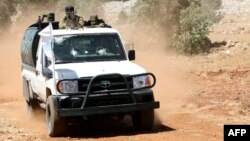A senior U.S. official says some, but maybe not all, militant rebel holdouts have pulled out of the demilitarized zone in Syria's Idlib province, two days after the deadline to leave.
"There is some question as to whether everybody from HTS [the militant group Hayat Tahrir al-Sham] has left," Special Representative James Jeffrey told reporters Wednesday. "But there has been some withdrawal of the terrorists from that zone."
The al-Qaida-linked HTS is the most powerful jihadist group inside Idlib — the last major part of Syria still controlled by the rebels.
Along with the withdrawal of at least some of the militants, Jeffrey said all heavy weapons have been taken out of the buffer zone.
"This is a major step because what it's done is it has frozen the conflict not only there, but the conflict is also frozen essentially everywhere else."
Idlib is the last major part of Syria still controlled by the rebels.
Under a deal brokered by Russia — Syria's top ally — and Turkey, which backs the rebels, forces from both sides agreed to pull back and form a demilitarized zone inside Idlib along the border.
With a Syrian military attack appearing to be imminent last month, the deal averts — at least for now — a likely bloodbath and humanitarian catastrophe in Idlib.
But Syria has said it is still determined to take back all of its territory.
U.N. envoy for Syria
Also Wednesday, the U.N. envoy for Syria, Staffan de Mistura, announced he is leaving the job at the end of November after four years in the role.
De Mistura told the Security Council he is stepping down for "purely personal reasons" and to give "a little bit of attention to his family."
De Mistura plans to go to Damascus next week to try to form a committee that would write a new post-war constitution for Syria and pave the way for elections.
De Mistura is the third U.N. diplomat to try but fail to bring peace to Syria. Former Secretary-General Kofi Annan and Algeria's Lakhdar Brahimi preceded him. De Mistura's successor has yet to be named.
Humanitarian aid
Meanwhile, the Syrian government has given the U.N. permission to deliver food and other humanitarian aid to the 50,000 women and children in the Rukban refugee camp, near the borders with Iraq and Jordan.
There have been no deliveries since January. A Syrian military siege of the camp has put thousands of civilians in danger of starvation.
U.N. officials describe conditions as critical. Reuters reports at least 12 people have died in Rukban in the past week.
Wayne Lee contributed to this report.





